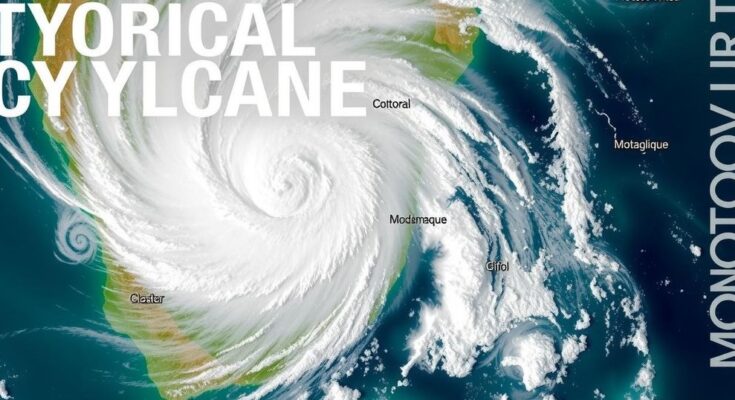Tropical Cyclone Chido, which struck Mozambique on December 15, 2024, has caused significant destruction in several districts. Despite the activation of four accommodation centers, many families remain displaced and are utilizing makeshift shelters. Key responses include improving living conditions, enhancing sanitation services, and rebuilding community facilities. The CCCM Cluster partners are actively coordinating relief efforts to address the growing humanitarian needs following the disaster.
On December 15, 2024, Tropical Cyclone Chido struck the Mecúfi district in Mozambique, severely affecting the southern Cabo Delgado and Niassa districts, alongside northern Nampula. The cyclone inflicted substantial damage on infrastructure, caused casualties, and displaced numerous families, exacerbating already urgent humanitarian needs. In response, the CCCM Cluster partners, including the International Organization for Migration (IOM), the United Nations High Commissioner for Refugees (UNHCR), ASMOG, and Pronanac, have engaged in coordinated relief efforts with local authorities from December 14 to 30, 2024.
While only four accommodation centers have been officially designated by the National Institute for Disaster Risk Reduction Management (INGD) – three in Pemba and one in Chiúre – assessments indicated the use of schools in the Chiúre, Metuge, and Mecúfi districts to shelter affected populations, thereby highlighting the need for proper classification of these sites. Families are still resorting to sleeping outdoors, in neighbors’ yards, or in makeshift shelters due to the loss of their homes. Beyond basic necessities such as food, water, and hygiene services, initiatives are greatly needed to enhance the living conditions of these communities by ensuring adequate lighting and sanitation facilities, particularly in communal areas.
Community restoration efforts are vital, including public service improvements and the rebuilding of destroyed community centers. IOM has taken measures to support mobile teams in Pemba to assist families residing in these temporary accommodations, particularly in regards to strengthened coordination and basic services. Despite UNHCR and Pronanac’s withdrawal from managing three accommodation centers, the ongoing collaboration with local authorities persists as a crucial component of the relief operation.
The report details the aftermath of Tropical Cyclone Chido in Mozambique, highlighting the devastating impact on local populations and infrastructures. It provides an overview of the response actions taken by humanitarian organizations in conjunction with local government efforts to assist the affected communities. The context illustrates the challenges faced by displaced individuals, including inadequate shelter and essential services, which call for immediate and effective interventions by various sectors and teams.
In conclusion, the response to Tropical Cyclone Chido underscores the need for comprehensive and coordinated humanitarian efforts to address the immediate and long-term needs of the affected populations in Mozambique. Ensuring appropriate shelter, sanitation, and community rebuilding initiatives are vital to restoring dignity and safety for the displaced families. Ongoing collaboration among governmental bodies, international agencies, and local communities is essential to facilitate effective assistance and support recovery efforts.
Original Source: reliefweb.int




